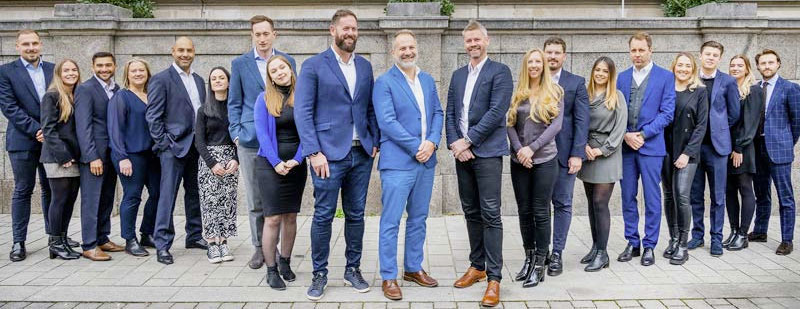
How much deposit do I need for a £1 million house?
The size of the deposit you need to buy a £1 million house depends on the mortgage lender you approach and your income and financial assets. The absolute minimum required is £50,000, although applicants will need £100,000 or £150,000 deposits for most lenders.
Trinity Financial has access to various mortgage lenders offering 5% deposit mortgages for £1 million properties. Two larger lenders are private banks, and one is through Kent Reliance for Intermediaries.
Securing a 10% mortgage if you buy a £1 million property is more straightforward. Trinity Financial has access to lenders like Santander for Intermediaries and Clydesdale Bank for Intermediaries, which offer these mortgages.
Aaron Strutt, product director at Trinity Financial, says: “It is possible to secure lower deposit mortgages to buy £1 million properties, but it is subject to mortgage affordability and credit scores.
"The mortgage loan size will be reduced if you have credit cards, loans, cars on finance, or private school fees. However, if you have investments, buy-to-let properties, or other income, it may be possible to use the funds to boost your affordability.
"To access the most competitively priced rates, borrowers typically need a 40% deposit for the lowest rates currently around 4.25%, but with a 5% deposit mortgage through lenders like Investec, the rate will be around 5.65%.”
Assess Your Financial Position
Before applying for a £1 million mortgage, you need to understand your finances:
• Income Requirements: Lenders typically offer 4 to 5.5 times your annual income. For a £1 million mortgage, you’ll likely need an income of £180,000–£250,000 annually (depending on other factors like debts and outgoings). Some building societies offer six times salary mortgages, but you need a larger deposit to qualify.
• Credit Score: Ensure your credit score is excellent, as large mortgages often require top-tier creditworthiness. Before you apply for a mortgage, it is worth getting a copy of your credit report and ensuring there are no errors or potential issues.
We are speaking to more people with credit blips, which means they struggle to get mortgages through high-street lenders. Some banks and building societies accept applications from borrowers when they can explain what happened or when they have minor financial issues.
• Affordability Assessment: Lenders evaluate your monthly expenses, including existing debts, household costs, and dependents. They typically want to see bank statements, payslips, tax returns, and company accounts if you are self-employed.
Types of Mortgages
For a £1 million mortgage, consider the following options:
• Repayment Mortgage: You repay both interest and capital monthly. This is best if you want to fully own the property at the term's end. Many lenders allow up to 10% of the mortgage to be repaid each year without charge, and some lenders allow 20% overpayments.
• Interest-Only Mortgage: You pay only the interest each month, with the capital repaid at the end of the term. Suitable if you plan to repay the capital (e.g., investments or asset sales). Some lenders allow borrowers to take a part interest only and part capital repayment to lower the monthly costs while ensuring some of the mortgage is repaid.
• Fixed-Rate Mortgage: Your interest rate stays the same for a set period (e.g., two, five, or 10 years). This type of mortgage is good for stability. Most borrowers opt for two—or five-year fixes, and the price difference between these rates has reduced in recent months.
• Variable-Rate Mortgage: Interest rates fluctuate with the market and Bank of England base rate changes. Options include trackers (linked to the Bank of England base rate) or standard variable rates (SVRs). Some lenders offer variable rates without early repayment changes.
Additional Costs Beyond the mortgage itself, consider these costs:
• Stamp Duty: For a £1 million property in England, Stamp Duty is around £41,250 (assuming it’s your primary residence). The amount of Stamp Duty you pay will vary depending on whether you are buying your first home, moving up the property ladder or buying a second property. Click here to use our Stamp Duty calculator.
• Legal Fees: Solicitors typically charge £1,500–£3,000 for conveyancing. Many of Trinity's clients use SAS Daniels solicitors.
• Valuation and Survey: Expect to pay £500–£2,000, depending on the survey type. Mortgage lenders often provide a free standard property valuation, which does not include a detailed survey. They often rely on their IT systems to value a property rather than sending a valuer to inspect it. If you want a thorough inspection, you need to appoint a firm. We have Alexander Lyons on our partners' page.
Call Trinity Financial on 020 7016 0790 to secure a mortgage, book a consultation, or complete our mortgage questionnaire.
The information contained within was correct at the time of publication but is subject to change.
Your mortgage is secured on your property. Your property may be repossessed if you do not keep up repayments on your mortgage
Nationwide for Intermediaries offers a two-year fix at 3.90% for larger mortgage loans between £300,000 and £5 million for borrowers purchasing a property. The overall cost for comparison is 6.7% APRC. The fixed rate is 0.05% more expensive for remortgages.
If you borrowed £1 million on the 3.90% two-year fix, the monthly interest-only cost would be £3,250 increasing to £4,716.68 on capital repayment over a 30-year term.
This mortgage is available on either an interest-only or capital repayment basis, and borrowers require a 40% deposit to access the rate. After two years, Nationwide's mortgage will revert to a standard variable rate of 6.99% unless you switch deals, and early repayment charges apply.
Representative example: A Nationwide capital and interest mortgage of £1,000,000 payable over 30 years, initially on a fixed rate basis at 3.90% for two-years and then on the lender's 6.99% standard variable rate for the remaining 28 years. The 3.90% rate would require 24 monthly repayments of £4,716.68 followed by 336 payments of 6,541.36. The total amount repayable would be £2,312,611.28 made up of the loan amount, plus interest (£1,311,097.10) and £1,495 (product fee), £0 (final repayment charge), £15 (completion fee). The overall cost for comparison is 6.7% APRC representative.
Contact Trinity Financial on 020 7016 0790 to find out how much your £1 million mortgage would cost.
- Lloyds Banking Group makes £2bn* lending available to first-time buyers borrowing between 4.5x salary and up to 5.5x salary
- New loan-to-income ratio designed to boost maximum mortgage loan sizes
- Up to 22% additional lending with First Time Buyer Boost scheme
Trinity Financial's brokers have access to specialist contacts at many of the biggest banks and building societies, as well as private banks and niche lenders.
These contacts help us to get mortgages agreed quickly and efficiently. In some cases, we even get borrowers the mortgage they need when they fall outside of the lender's standard qualification criteria.
Trinity Financial has extensive lists of contacts, and depending on your financial situation or the type of property you are buying, we can put your application in front of them.
Most borrowers taking out a mortgage opt for a two or five-year fix. But is it better to fix in for two or five years? At the moment two year fixes are slightly cheaper than many five-year fixes.
The length of the mortgage rate borrowers take often depends on their attitude to risk. Most people do not want to fix into a higher rate than necessary, especially with multiple banks and economists expecting the Bank of England base rate to come down this year. However, given current global affairs, there is also a chance rates could go up.
With so many homeowners due to remortgage this year and huge numbers of first-time buyers and home-movers set to buy, choosing the right mortgage deal is essential and not necessarily straightforward.
Taking a shorter-term fix or tracker without an early repayment charge often makes sense for borrowers who are not sure whether they want to sell their home or think their personal or financial situation may change.
Call Trinity Financial on 020 7016 0790 to discuss your options.
• You can contact one of our consultants by calling 020 7016 0790, or complete our basic enquiry form or mortgage questionnaire for a more detailed initial response.
• You tell us what you are looking for and the property type you want to buy. We assess your mortgage and financial protection needs based on your monthly budget.
• We collect the information and documentation that the lenders and providers need.
• Based on the information supplied, we provide you with illustrations of the most suitable products for your circumstances.
• We then apply on your behalf to secure a mortgage offer as quickly as possible. This is once you have confirmed you are happy to proceed.
• We manage the application through to completion and liaise with all involved parties, including valuers, estate agents, and solicitors.
• Post-completion, we are available for any questions. When you reach the end of your initial product, we can also discuss any further mortgage, will or financial protection product requirements.
As part of our ongoing service commitment, we will contact you at least five months prior to your fixed or tracker rate expiring to ensure you avoid reverting to an expensive standard variable rate.
At Trinity Financial, we constantly monitor the £1 million+ mortgage market. Click here to view our £1 million mortgage table, which highlights the pick of the large loan rates.
https://www.trinityfinancialgroup.co.uk/mortgage-tools/million-pound-mortgage-best-buys/













